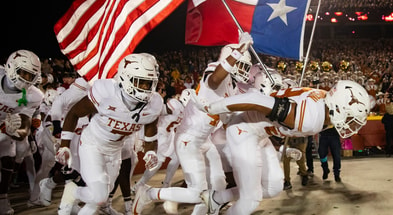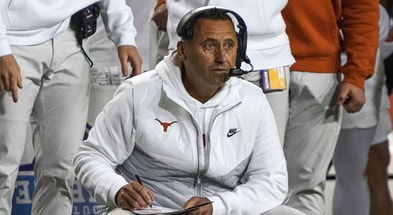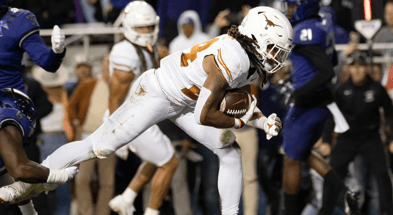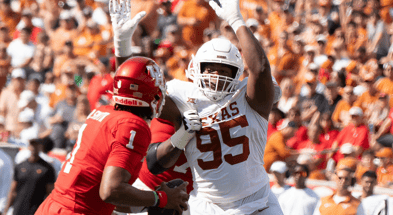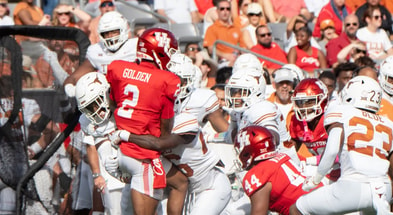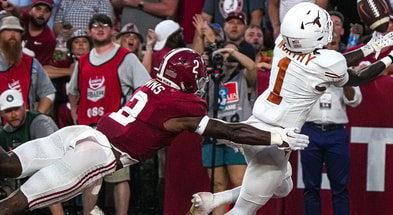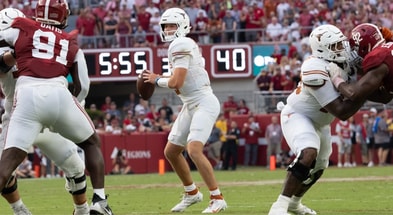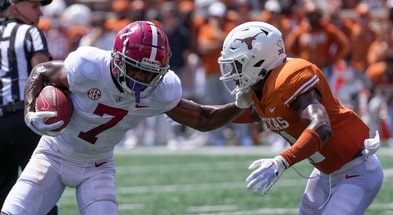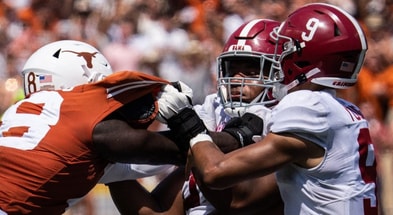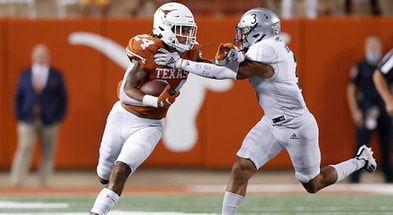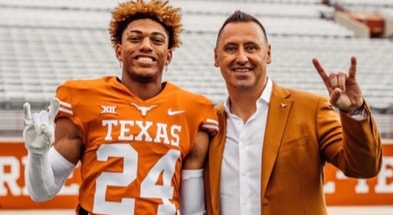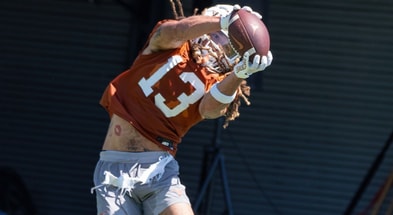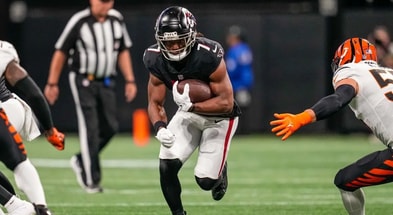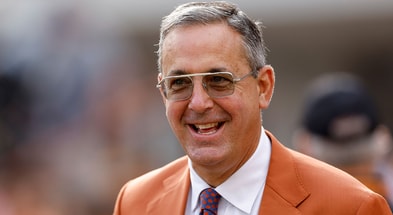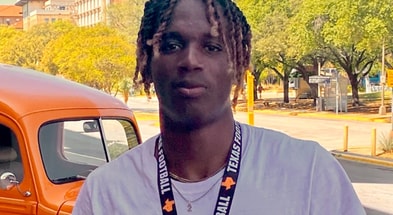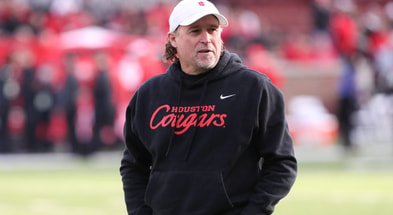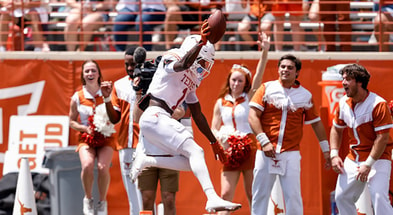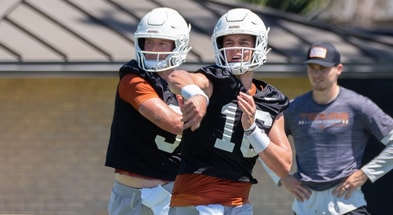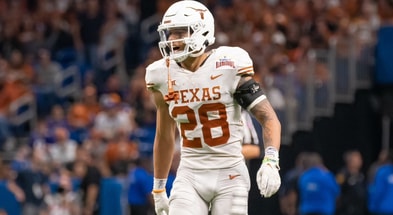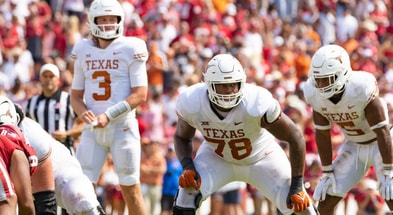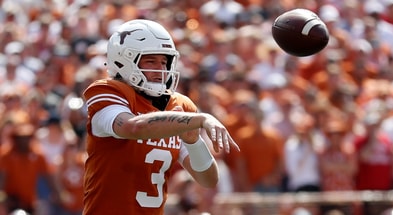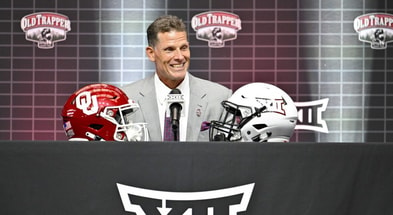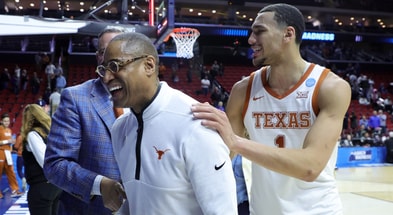Defensive improvement justifies Sarkisian's non-decision
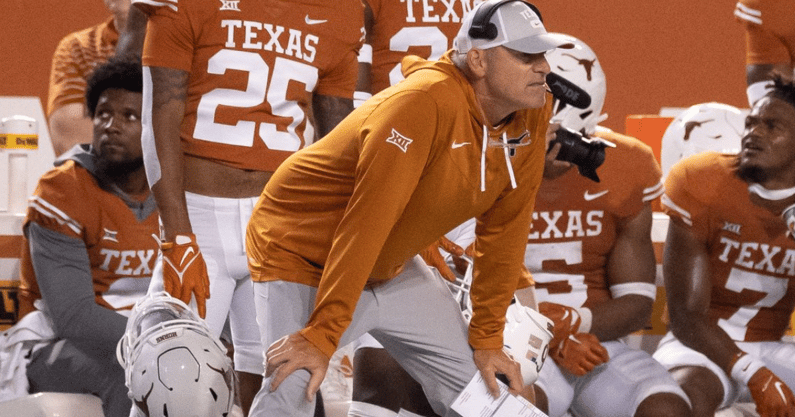
A year ago the junior experts of Texas fandom, of which I’m a part of, were divided over what Steve Sarkisian should do with regards to his defensive coaching staff. This being the Texas fanbase, there’s an internal alarm clock that rings every fall reminding us our platelets are getting low and we’re in need of a new-blood transfusion.
[Get a FREE 7-day trial of Inside Texas Plus!]
The last time Texas didn’t make a coaching change due to underachieving was prior to the 2019 season. Surely going 5-7 in 2021 warranted some sort of change, right?
Those who advocated for continuity argued change for the sake of change doesn’t always work. Of course that’s often the case but there’s a ‘do something’ impulse that often rears its ugly head. Forget the contracts involved, a year is a significant investment in a coach, especially the more players he oversees. A defensive coordinator oversees half the roster. That investment is allocated towards teaching schemes, techniques within those schemes, fundamentals, and of course the big one, recruiting targets who fit his preferences. Making a change begins the process anew and then you’re discussing the potential of wasting valuable years of player eligibility.
Those who advocated for change usually cited inch deep observations like ‘he’s not getting it done’ or ‘he’s not suited for the Big 12’ or ‘he’s in over his head.’ These weren’t the most compelling arguments. In their defense, the change agents did make some valid contributions to the argument, usually regarding in-game decision-making, or lack thereof.
But for the most part, criticism towards Pete Kwiatkowski and the other defensive coaches was based more on emotion rather than rationale.
Context is our friend, and here’s some context that favored PK in addition to his long track record of success prior to joining Texas.
- Only one coach on staff was familiar with his defense. Usually a coordinator will have at least a couple
- Inherited talent and depth was poor and/or ill-suited to his defense
- His arrival was too late to properly address needs in the portal
- Team-wide culture was not great which typically affects defense more than offense
- Known for being a developer of talent, one offseason with insufficient talent is not enough time
- The defense was often hindered by ineffective Texas offense, particularly in second halves
Let’s take a look at each bullet point and where Texas is now.
- Jeff Choate was that one coach who had familiarity with PK’s system, and his linebackers look night and day different from last season. Terry Joseph and Blake Gideon, with the help of Gary Patterson, have their secondary hard-wired into the defensive front. Huge improvement over last season with the defense playing faster by the week
- Talent is improved, but largely due to development and promising young players taking the next step. The law firm of Barron, Byron, and Barryn are three shining examples of the latter
- Texas didn’t use much portal capital on defense, but Ryan Watts has been genuinely good and Diamonte Tucker-Dorsey has been the third linebacker
- This team has played with effort since the first whistle against UL-M and they have bounced back after difficult losses. Physicality has often been a strength
- It wasn’t just the young players who improved. We haven’t seen this level of overall defensive development in a very long time. Fundamentals, pursuit, and tackling are all much better
- There have been times this season when the offense let down the defense and vice versa, but complementary football is improved over last season, especially on the defensive side
Defensive improvement didn’t just register on your television set, it also showed up in the data. For those who like numbers to back up what they see, or for any remaining skeptics, here’s a look at defensive year-over-year improvement with only the Baylor game remaining. A more complete explanation of each metric can be found at Football Outsiders.
Top 10
- 1
A Twisted Mess
Big 12 Championship scenarios
- 2Trending
Saban chirped
Big 12 comes after GOAT
- 3Hot
Underranked SEC
Lane Kiffin protests CFP rankings
- 4
UConn star hospitalized
Alex Karaban hospitalized at Maui Invitational
- 5
DJ Lagway
Fan flashes Florida QB to Pope
| 2021 DFEI | 2022 DFEI | ||
| DDE | 88 | 34 | Drive efficiency |
| DTD | 82 | 23 | Touchdown rate |
| DVD | 83 | 57 | Value drive rate |
| DFD | 90 | 33 | First down rate |
| DBD | 108 | 19 | Drives gaining 0 yards or less |
| DTO | 81 | 108 | Drives ending in turnover |
| Overall | 52 | 13 |
These are dramatic improvements, save forced turnover rate. (Texas should have been better in this regard, though they had a lot of missed opportunities of the ‘way the ball bounces’ variety.)
Pete Kwiatkowski doesn’t deserve all of the credit for defensive improvement, and the program still isn’t where it needs to be, but because of continuity and Sark’s trust in him it is trending in the right direction, especially as they continue to accumulate upper echelon talent.
Just like the defense received a boost from younger players this season, to include All-Conference level play from Jaylan Ford and Jerrin Thompson, we’ll see another boost from a handful of players next season. Texas will have a solid nucleus of talent to build around.
Due to attrition there will be holes on defense to plug, made more glaring by the staff’s development of upperclassmen, but given the immediacy of portal help that’s not nearly the concern it once was especially at Texas where good leadership is back in place.

